Today, many spend long hours in front of their computers, engrossed in their smartphones, or enduring lengthy commutes. While these activities have become integral to our daily lives, they often have an unwanted side effect: neck and shoulder strain. The discomfort and pain that can result from poor posture and prolonged periods of sitting are all too familiar to many of us. But could a simple solution like a neck pillow hold the key to alleviating this common ailment?
Causes of Neck and Shoulder Strain

Neck and shoulder strain, or neck and shoulder pain or discomfort, refers to the discomfort or pain experienced in the neck and shoulder region. It can range from mild discomfort to severe pain and may affect one or both sides of the body. Neck and shoulder strain can be caused by a variety of factors, including:
Poor Posture
Prolonged periods of sitting or standing with improper posture can strain the muscles in the neck and shoulders.
Muscle Tension
Stress, anxiety, or tension can lead to muscle tightness and discomfort in these areas.
Overuse
Repetitive movements or activities that involve the neck and shoulders, such as computer work or lifting heavy objects, can strain the muscles.
Injury
Trauma or injury, such as whiplash from a car accident or a sports-related injury, can lead to neck and shoulder pain.
Medical Conditions
Underlying medical conditions, such as arthritis, herniated discs, or nerve compression, can contribute to strain and discomfort in these areas.
Why Is It Important to Have A Proper Neck and Shoulder Support?
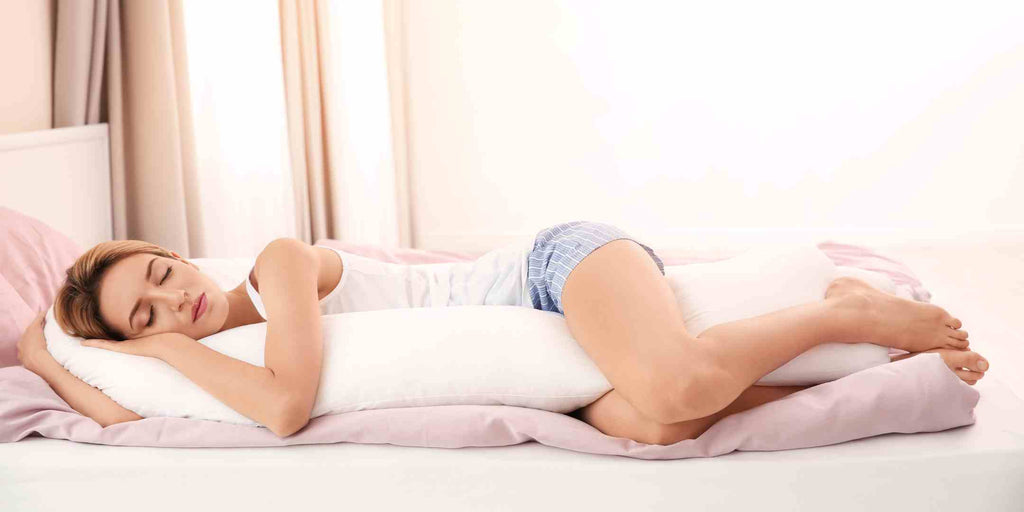
The importance of proper neck and shoulder support cannot be overstated, as it plays a crucial role in maintaining overall comfort, health, and well-being. Here's an explanation of why proper support for the neck and shoulders is essential:
Pain Prevention
When the neck and shoulder muscles are not adequately supported, they can become strained or overworked, leading to discomfort or pain. This is particularly relevant for individuals who spend long hours sitting at a desk, working on a computer, or engaging in activities that put stress on these areas.
Posture Improvement
Maintaining the natural curvature of the spine and neck is essential for reducing the risk of strain and injury. Supportive pillows and ergonomic accessories can encourage proper alignment and reduce the likelihood of poor posture-related issues.
Reduced Stress and Tension
Supportive pillows and devices can help alleviate stress and tension in the neck and shoulder muscles. This is especially beneficial for people who carry stress in these areas, as it can contribute to relaxation and improved comfort.
Enhanced Sleep Quality
A well-designed neck pillow or mattress can cradle the neck and shoulders, reducing the chances of waking up with stiffness or pain. Quality sleep, in turn, positively impacts overall health and productivity.
Long-Term Health Benefits
Consistently providing proper support to the neck and shoulders can have long-term health benefits. It can reduce the risk of chronic conditions related to poor posture or muscle strain, such as tension headaches, cervical spine issues, and shoulder impingement.
Role of Pillows in Maintaining Proper Posture
Cervical Support
Cervical pillows, also known as neck pillows or orthopaedic pillows, are designed to cradle and support the natural curve of the cervical spine (the neck). This support keeps the neck in a neutral position during sleep or rest. This alignment reduces strain on neck muscles and ligaments, promoting proper posture.
Spinal Alignment
Pillows placed under the head, between the knees, or behind the back can help maintain proper spinal alignment. For example, when sleeping on your side, a pillow between the knees can align the hips and prevent the spine from twisting, reducing strain on the lower back. Similarly, placing a pillow under the lower back when sitting can maintain the natural lumbar curve and support proper sitting posture.
Ergonomic Support
Many people spend extended periods sitting at desks or working on computers. Ergonomic pillows for chairs and lumbar rolls can support the lower back and lumbar region, preventing slouching and promoting an upright posture.
Alignment During Sleep
A pillow that is too high or too flat can cause the head and neck to be in an unnatural position, leading to neck and back pain. Proper pillow selection ensures that the spine remains aligned during sleep, contributing to overall posture.
Comfort
Pillows that provide support and comfort encourage individuals to maintain better posture because they are less likely to shift into slouched or uncomfortable positions.
Types of Neck Pillows
Cervical Pillows
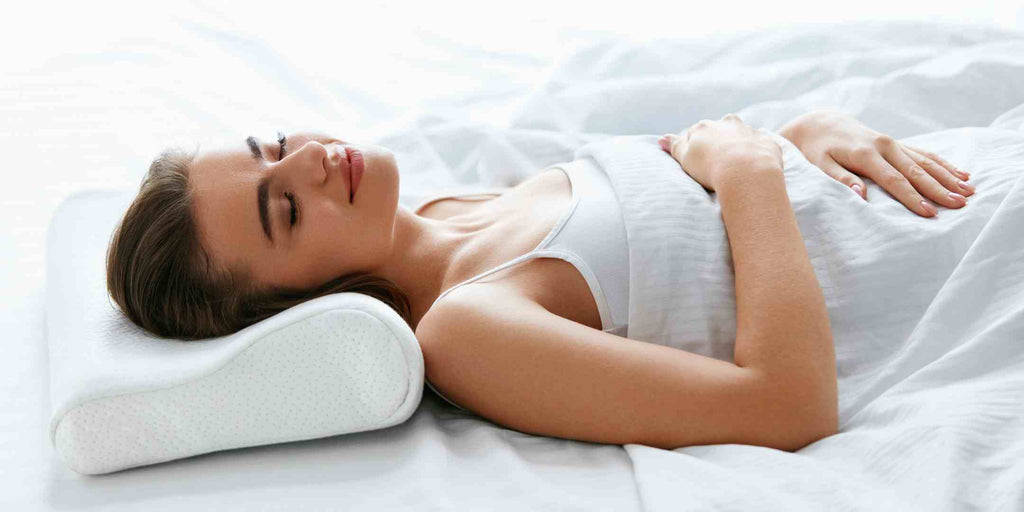
Cervical pillows, often called orthopaedic or contour pillows, are uniquely designed to provide targeted support to the neck and head. Their contoured shape aligns with the cervical spine's natural curve, promoting proper posture during sleep. These pillows are recommended for individuals experiencing neck pain, stiffness or those with specific medical conditions related to the neck and upper spine, as they help alleviate discomfort and maintain proper spinal alignment.
Memory Foam Pillows

Memory foam pillows are crafted from viscoelastic foam that conforms to the head and neck contours. This adaptive material responds to body heat, offering a custom-fit experience that supports the head and neck while evenly distributing weight and reducing pressure points. Renowned for their comfort, memory foam pillows are an excellent choice for individuals seeking support and a plush, cradling sensation during sleep.
Travel Pillows
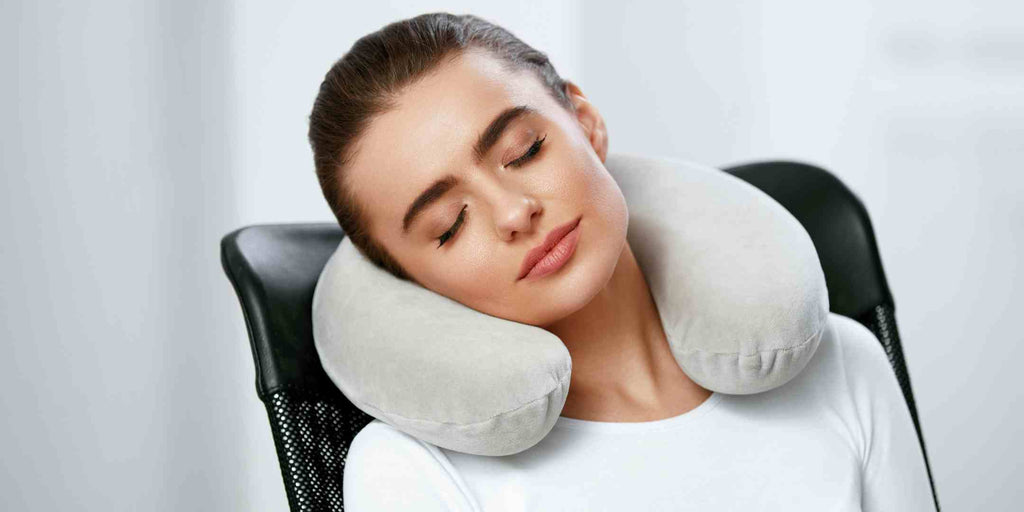
Travel pillows are designed with portability and comfort, making them ideal for long journeys by plane, train, or car. They come in various shapes, including U-shaped, rectangular, and inflatable, and are intended to provide essential support and comfort to the neck and head while seated during travel. Their compact size and travel-friendly designs ensure that individuals enjoy a restful journey, minimising the risk of neck discomfort or stiffness often associated with extended trip.
Water-Filled Pillows
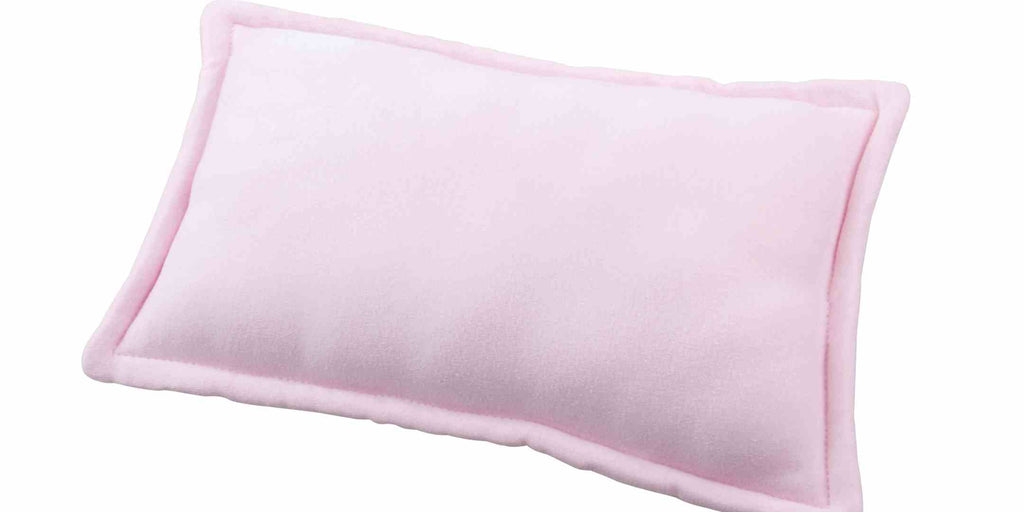
Water-filled pillows feature an inner chamber that can be filled or emptied to adjust the pillow's firmness and support level according to personal preferences. These pillows offer customisable support and consistency as they adapt to the desired firmness by adding or removing water. They are valued for their ability to maintain consistent support throughout the night, promoting a comfortable and restful sleep experience tailored to individual needs.
Speciality Pillows (e.g., Orthopaedic or Contour Pillows)
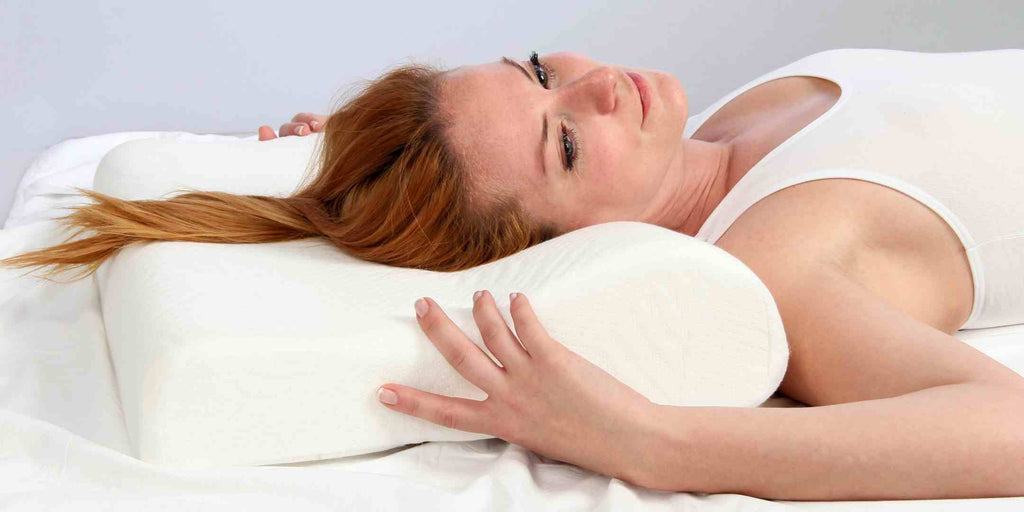
Speciality pillows encompass designs tailored to specific needs, including orthopaedic and contour pillows. Orthopaedic pillows are engineered to support proper spinal alignment and may feature unique shapes or materials, relieving individuals with neck, back, or spinal issues. Contour pillows often have a sculpted shape that conforms to the natural curvature of the head, neck, and shoulders, offering personalised support for improved sleep quality and comfort.
Factors to Consider When Selecting a Neck Pillow
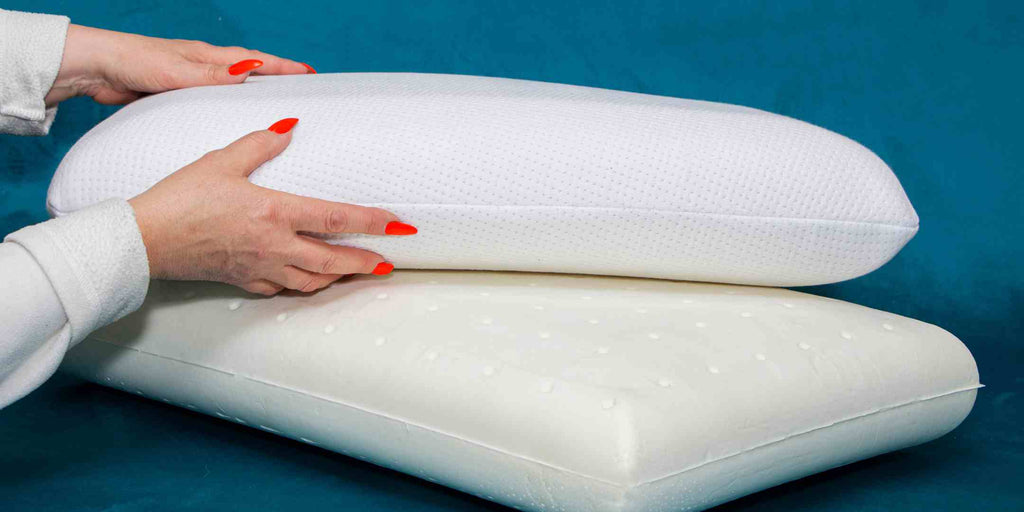
Sleeping Position
Your preferred sleeping position plays a significant role in determining the type of neck pillow you should choose. For example, a cervical pillow with proper neck support is ideal if you primarily sleep on your back. Side sleepers may benefit from a thicker pillow to maintain spinal alignment, while stomach sleepers should opt for a thinner, softer option to prevent strain.
Neck Support
The primary function of a neck pillow is to provide adequate support to the neck. Look for a pillow that maintains the natural curve of your neck when you lie down. Cervical pillows, with their contoured shape, are specifically designed for this purpose, offering tailored support to different neck parts.
Firmness Level
The firmness of the pillow should align with your comfort preferences. Some people prefer a softer pillow that allows for a gentle sink-in, while others prefer a firmer pillow with more support. Memory foam pillows, for instance, come in various firmness levels to cater to different preferences.
Material
Consider factors such as allergies, temperature sensitivity, and personal comfort when selecting a material. Memory foam, for example, contours to your shape and is hypoallergenic, making it a popular choice.
Size and Shape
The size and shape of the pillow should match your body frame and the dimensions of your bed. Larger pillows provide more surface area for movement, while smaller ones may offer better support for targeted areas. The shape, such as a standard rectangular pillow or a uniquely contoured design, should fit your neck and head comfortably.
Allergies and Hypoallergenic Options
If you have allergies or sensitivities, opt for hypoallergenic pillow materials to minimise potential allergic reactions. Many pillows are now designed with hypoallergenic covers and fillings.
Conclusion

The efficacy of a neck pillow in preventing neck and shoulder strain largely depends on individual preferences and specific situations. While neck pillows can provide valuable support and comfort during rest, they are not a one-size-fits-all solution. Therefore, it is essential to carefully consider one's unique needs and consult with a healthcare professional if experiencing chronic neck and shoulder strain. Ultimately, a neck pillow can promote better sleep and reduce strain for many individuals. Still, its success depends on its compatibility with an individual's specific requirements.
Disclaimer: All the information, including the texts, images, and other materials on this website, is for educational purposes only. While we aim to provide accurate information, nothing on the Megafurniture website should be considered a replacement for medical advice, diagnosis, or treatment. Always consult a qualified medical professional before making any decisions regarding your health.










